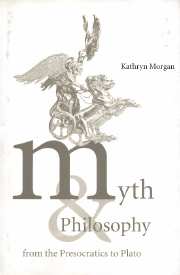Book contents
- Frontmatter
- Contents
- Acknowledgements
- 1 Introduction
- 2 Theoretical issues
- 3 Some Presocratics
- 4 The sophists and their contemporaries
- 5 The Protagoras: Platonic myth in the making
- 6 The range of Platonic myth
- 7 Plato: myth and the soul
- 8 Plato: myth and theory
- 9 Conclusion
- Bibliography
- Index of passages cited
- General index
1 - Introduction
Published online by Cambridge University Press: 22 September 2009
- Frontmatter
- Contents
- Acknowledgements
- 1 Introduction
- 2 Theoretical issues
- 3 Some Presocratics
- 4 The sophists and their contemporaries
- 5 The Protagoras: Platonic myth in the making
- 6 The range of Platonic myth
- 7 Plato: myth and the soul
- 8 Plato: myth and theory
- 9 Conclusion
- Bibliography
- Index of passages cited
- General index
Summary
This is not a book about ‘mythical thinking’, although it is about both myth and thought. Treatments of mythical thinking try to specify some system of thought as ‘other’, as primitive, mystical, childish, or irrational. The difficulties of identifying and explaining purported different mentalities are by now well known, and the explanatory utility of such a procedure is limited. Nor do I wish to attempt a rehabilitation of ‘myth’ in the face of ‘philosophy’. It has been suggested, for instance, that myth is a ‘pre-philosophical “mirror” of existential thought’, a liberation from excessive abstraction and objectivism, a primal, original, and essential form of truth. The validity of these assertions I am unable to gauge, for the myth with which this book is concerned is post-philosophical. It is myth seen through a philosophical lens and incorporated into philosophical discourse. As a form of truth it is neither primal nor original. From the standpoint of the philosophers we shall meet in the following pages, non-philosophical myth is a story about truth that is often pernicious and misleading. The myth they incorporate serves their own ends. These ends are: the reformulation of people's ideas about literary and cultural authority, the problematisation of the different modes of linguistic representation, and the creation of a self-reffective philosophical sensibility.
The story of philosophy's relationship with and transformation of myth is the story of its relationship with convention, both literary and societal.
Information
- Type
- Chapter
- Information
- Myth and Philosophy from the Presocratics to Plato , pp. 1 - 14Publisher: Cambridge University PressPrint publication year: 2000
Accessibility standard: Unknown
Why this information is here
This section outlines the accessibility features of this content - including support for screen readers, full keyboard navigation and high-contrast display options. This may not be relevant for you.Accessibility Information
- 2
- Cited by
